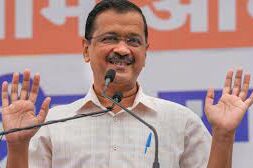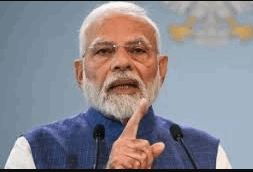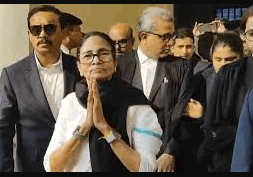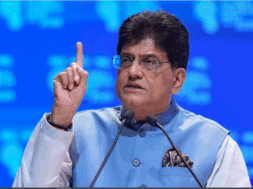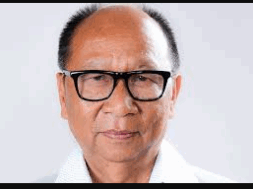
Manas Dasgupta
NEW DELHI, Apr 14: The long-expected summons from the Central Bureau of Investigation to the Delhi chief minister Arvind Kejriwal has finally come. The CBI has summoned Kejriwal “as a witness” for questioning over alleged corruption in the capital’s now-scrapped alcohol sales policy that led to the arrest of his deputy Manish Sisodia in February, officials said on Friday.
Kejriwal has been asked to be present at the agency headquarters at 11 a.m. on Sunday to answer queries of the investigating team, they said.
Addressing a press conference, AAP Rajya Sabha MP Sanjay Singh said the CBI summon was a conspiracy to arrest CM Kejriwal. “Delhi chief minister had spoken about the Adani issue in Delhi Vidhan Sabha. That same day, I had told him that you will be next. Narendra Modi-led Centre is corrupt from head to toe and Kejriwal’s fight against corruption won’t stop due to such notices,” Singh said. “This notice is a conspiracy to arrest CM Kejriwal. This notice will neither be able to silence the AAP nor Kejriwal,” he said.
It is alleged that the Delhi government’s excise policy for 2021-22 to grant licences to liquor traders favoured certain dealers who had allegedly paid bribes for it, a charge strongly refuted by the AAP. The policy was later scrapped.
Sources said it is the first instance in recent memory where a Chief Minister has been summoned by the central agency in an investigation. Sources in the agency said they have uncovered fresh evidence and have grounds to question the Chief Minister now. They said the date was set for Sunday so that it does not disrupt the Chief Minister’s work.
Arvind Kejriwal is yet to comment on the CBI’s move but in the past has said, “There is no such thing as a liquor scam.” The AAP has dismissed the charges as “vendetta” and efforts by the BJP, which governs at the centre, to target one of Prime Minister Narendra Modi’s most vocal critics.
“Not a single leader of the AAP will be intimidated by these motivated charges. Many of our ministers, leaders and members have been targeted in the past. Our fight against the most corrupt government of Modi will go on,” Sanjay Singh said.
Alleging the involvement of the “highest levels” of Kejriwal’s government in the swindle, the agency has claimed crores in kickbacks were paid for favours in the policy and funnelled into the AAP’s election campaign in Goa last year.
Manish Sisodia’s arrest in February was the highest-profile arrest in the case so far. The following month, he was arrested while still in jail by the country’s financial crime-fighting agency Enforcement Directorate, which is probing allegations of money laundering in the case.
The summons to Mr Kejriwal, whose political career began with the 2011 anti-corruption movement that swept the nation, comes as his 10-year-old party, recently upgraded to the status of a national outfit, tries to position itself as one of the main alternatives to PM Modi’s BJP.
They also follow an intensifying effort by opposition parties to band together ahead of next year’s elections, alleging the widespread abuse of central investigating agencies.
Among the first opposition parties to come out in Mr Kejriwal’s support was Bihar’s Rashtriya Janata Dal, whose leader Manoj Jha taunted the centre, saying it should put all opposition leaders in a gas chamber and finish them off “Nazi-style.”
“It is this Arvind Kejriwal who gave the country a model of education and health and worked tirelessly for the welfare of the people of Delhi. It is for the sake of the country that he left his job as an income tax commissioner, went on a hunger strike for 13 days against corruption, and his struggle will not stop after this notice of yours,” Sanjay Singh said.
Kejriwal was not named as an accused in the first information report (FIR) filed on August 17 last year but his name has come up during the questioning of some accused and witnesses. CBI wants to seek clarification, an official said.
The Enforcement Directorate (ED) has alleged in one of its charge sheets that the now-scrapped Delhi excise policy was the “brainchild” of Kejriwal. The chief minister’s name has also been mentioned on multiple occasions by investigators in court documents including charge sheets and remand papers.
For instance, ED said in its charge sheet filed in January this year that Kejriwal, in a video call arranged by AAP’s communications in-charge Vijay Nair with Sameer Mahendru, told the latter that “Vijay (Nair) is his boy and that he should trust him.”
“Nair had arranged a meeting of the owner of Indo Spirits – Sameer Mahendru (who is part of a super-cartel along with the alleged “South Group”) with Arvind Kejriwal, and when that didn’t materialize, he arranged a video call through FaceTime on his phone for Mahendru and Kejriwal, where Kejriwal said to Mahendru that Vijay (Nair) is his boy and that Mahendru should trust him and carry on with him,” said the ED charge sheet citing Mahendru’s statement recorded on November 15, 2022.
Subsequently, citing a December 7, 2022, statement recorded by former deputy chief minister Manish Sisodia’s then secretary C Arvind, the federal agency has claimed that the decision to fix a 12% profit margin for the wholesale private entities was conveyed to him (C Arvind) at Kejriwal’s residence in mid-March 2021. .
There was no discussion in the Group of Ministers (GoM) meetings – Sisodia, Satyendar Jain and Kailash Gehlot were in the GoM – about giving wholesale business to private entities before mid-March 2021, C Arvind has told the ED.
“Suddenly, in the mid-March 2021, C Arvind was called by Sisodia to Kejriwal’s residence (where Satyendar Jain was also present) and Sisodia handed over a document to C Arvind which was a draft GoM report proposing that wholesale should go to private entities and asked him to prepare the draft GoM report based on the said document. He said it was the first time that he saw this proposal as the same was never discussed in any GoM meetings,” the charge sheet filed by ED alleged.
Agencies have also alleged that Kejriwal, Sisodia (currently in Tihar jail) and Nair are linked with the South Group (of politicians and businessmen), which got at least nine retail zones in Delhi’s liquor business in lieu of ₹100 crore allegedly paid to the AAP leaders.
The South Group, according to ED, comprises YSR Congress member of parliament Magunta Sreenivasulu Reddy or MSR, his son Raghav Magunta, Sarath Reddy (promoter of Aurobindo Group), and K Kavitha (daughter of Telangana chief minister K Chandrasekhar Rao) and Delhi businessman Sameer Mahendru. It was represented by Abhishek Boinpally, Arun Pillai and Butchibabu Gorantla in the meetings with the AAP’s communications in-charge Vijay Nair and other liquor businessmen.
ED also alleged that YSR Congress Member of Parliament Magunta Sreenivasulu Reddy met Arvind Kejriwal to find out more about Delhi excise policy and “that Kejriwal has welcomed his entry in Delhi liquor trade; that MSR wanted business base in Delhi liquor and Delhi CM welcomed him.”
Subsequently, Butchibabu Gorantla, former accountant of K Kavitha (daughter of Telangana chief minister K Chandrasekhar Rao), is alleged to have told the agencies on February 23 this year that “there was a political understanding between K Kavitha and the chief minister of Delhi (Arvind Kejriwal) and (former) deputy CM (Manish Sisodia) of Delhi. In that process, K Kavitha has also met (AAP’s communications in-charge) Vijay Nair on 19th-20th March, 2021”.
On AAP’s top leadership, ED alleged that the Delhi Excise policy 2021-22 “was created by the top leaders of the AAP to continuously generate and channel illegal funds to themselves.”
The excise policy, according to documents, “promoted cartel formations through backdoor, awarded exorbitant wholesale profit margin @ 12% and huge retail profit margin of 185% and incentivized other illegal activities on account of criminal conspiracy by the top leaders of AAP to extract kickbacks from the businesses.”
ED has alleged that a part of the ₹100 crore kickbacks generated in the Delhi excise policy was used in the AAP campaign in the 2022 Goa assembly election.
The agency has also pegged the loss in the excise policy irregularities at ₹2,873 crore.
The Delhi government’s 2021-22 excise policy aimed to revitalize the city’s flagging liquor business. It aimed to replace a sales-volume based regime with a license fee one for traders, and promised swankier stores, free of the infamous metal grilles, ultimately giving customers a better buying experience. The policy also introduced discounts and offers on the purchase of liquor, a first for Delhi.
The plan, however, came to an abrupt end, with Delhi’s lieutenant governor Vinai Kumar Saxena recommending a CBI probe into alleged irregularities in the regime. This ultimately resulted in the policy being scrapped prematurely and being replaced by the 2020-21 regime, with the AAP alleging that Saxena’s predecessor sabotaged the move with a few last-minute changes that resulted in lower-than-expected revenues.
